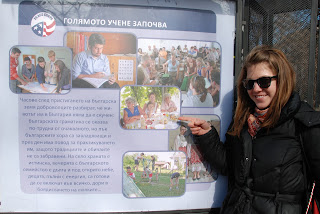Once in a while, when I’m sitting on a bus or walking to a friend’s house, it will hit me: I live in Bulgaria. How fantastic is that? I suppose it shouldn’t surprise me anymore, I’ve been here for nearly 9 months; and, it’s not so much the novelty of living in a foreign place that I notice anymore, but the very normalcy of it.
During training and the first few months at site, every experience was exciting and different. Time flew by, hardly leaving time to reflect on what was happening in the moment much less on a larger scale. I kept myself busy with an ambitious ‘to do’ list and tried committing every moment to memory. I didn’t want to miss anything from what I knew to be such a special experience. Tasting the homemade foods and drinks, milking a cow, going to monasteries, etc. all of these were individually amazing and brand new. My initial experience felt comprised by a sum of these events, each new thing something I could write down in bullet form under a “Life as a PCV in Bulgaria” heading.
After three quarters of a year, it’s obvious to me that this experience is much more than that. I can feel my concept of time and priorities evolving. But, abstractions on ‘finding myself’ aside, it’s the ways my normal has evolved that strikes me the most. Thoughts on normalcy usually arrive when something amusing occurs during a moment of relative stillness. For example, the other day I was super bundled up (hat, scarf, gloves, furry boots, long coat with fur hood pulled tight, etc.) and carefully picking my way down the snow and ice covered street, trying my best to avoid the worst patches of ice and frozen goat turds. Winter is beautiful here, but somewhat treacherous for the unskilled. I glanced up to see a much older woman, slightly bent forward, quickly pass. She wore clothes a fraction of the thickness of mine (long skirt, wool tights, knit socks, a bright scarf, and rubber mary-jane type shoes), but seemed undeterred by the freezing temperatures, just as her legs moved unhampered by the iced over streets. I found great amusement in how absurd I must look, some over bundled young person trying hard to walk, but mostly slipping and sliding down the street while an elderly woman effortless glides past in rubber shoes. Where else in my life could this moment occur?
It’s not that I can differentiate between the taste of pig and sheep livers, or that I have a bucket of cabbage and a braid of onions in my bedroom or that I sleep in my kitchen that seem out of the ordinary to me. Plus, it makes sense to heat only one room and animal liver is super healthy…But, had I described this life to an earlier self, it would have likely seemed difficult or at least a bit strange. It seems, however, that life is life everywhere, and new experiences fast become habits.
I don’t actively miss things like driving a car, having a gym nearby, eating sushi (the exception is a dishwasher machine, I hate doing dishes). These are surprisingly easy to live without, but, when I encounter them unexpectedly, they seem pretty awesome. For example, I recently rode in a car for the first time in a while. It seemed so strange and fun. I've grown accustomed to the plodding rattles and and human closeness of public transport vehicles - bus, minibus, train, tram - to ride in the FRONT SEAT of a fast, quiet car was like so cool! I write that without any sarcasm or irony. It really felt amazing.
For the rest of my life, no matter what I do or where I go, I will always have lived in Bulgaria, eaten pig liver, slept in my kitchen, and stored cabbage in my bedroom.
I fear that it sounds like my PC ‘takeaway’ revolves around the surface things like cabbage, liver, heating, and buses. It doesn’t, but the importance of these things has taken new meaning in a way I can't yet describe.
The part of my normal life in Bulgaria for which I am most grateful is the relationships. The people I’ve gotten to know have not only helped make the transition to life here nearly effortless, but have welcomed me into their homes and shared parts of their life with me. I am grateful for this… and for their stories, thoughts, advice, and occasional nagging. Of course, people are people everywhere, and they’re no different here. However, their stories are different. They’ve had experiences I can’t imagine. They’ve lived their lives while political systems rose, fell, and decayed. Their perspectives on modernity, their reflections on the past, their values and priorities-these are teaching me valuable lessons on life. I hope they stay with me the longest.



















































